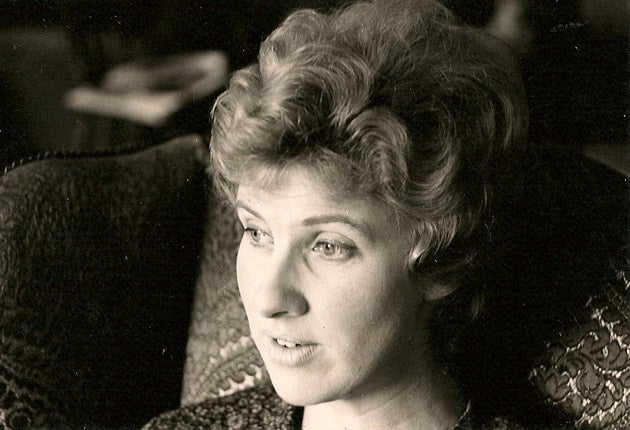Maureen Lehane: Celebrated mezzo-soprano who dedicated herself to the Jackdaws Music Trust

Although she became a widely admired mezzo-soprano, the musical talents of Maureen Lehane weren't encouraged during her schooldays at Queen Elizabeth's Grammar School in Barnet, but her supportive parents sent her to private singing lessons.
She subsequently gave up her textile design course at Hornsey School of Art and went to study instead at the Guildhall School of Music. In due course she took second place in the Ferrier Prize. From there, with an Arts Council award and after taking the advice of the baritone and conductor Dietrich Fischer Dieskau, she went to study in Berlin. This was not a success, and fearing for her voice she returned to England.
Unknown to her, her mother had submitted her name to John and Aida Dickens, who had been vocal coaches for Joan Sutherland. This was the beginning of a long-term relationship with the pair, during which she developed her brilliant coloratura, never heard better than in Handel Opera Society's Ariodante at Sadler's Wellsin 1974. Her voice was unique, not only in coloratura, but deeply moving,too, in slower music. Perhaps these two characteristics were never completely integrated, but for 20 years she was much in demand, singing in the UK, in Germany, Austria, Switzerland, Poland, Sweden and the US. In 1971 she undertook a five-month tour of Australia and the Far and Middle East.
With the exception of Handel, she sang little opera. She said she felt ill when she entered an opera house. Nevertheless, she got excellent reviews, first at Hintlesham Hall singing Purcell's Dido in 1966 (a part she repeated in the Netherlands in 1976) followed in 1967 by Cavalli's L'Ormindo at Glyndebourne which she dovetailed with the name part of La Cenerentola, again at Hintlesham. In 1971, with Valerie Masterson, she sang Rossini's Tancredi as part of the St Pancras Arts Festival. In 1974 her husband, Peter Wishart, wrote his opera Clytemnestra for her. She described it as "difficult". Her most high-profile opera experience was as Marcellina in The Marriage of Figaro in Cologne in 1975 in which she was described as being "straight out of Goya". Despite this, she did not enjoy it.
But Handel opera was different and she was an influential singer at the beginning of the great Handel opera revival, singing in 12 full productions with the Handel Opera Company in London and in Abingdon, Birmingham, Berkley California, New York, Göttingen and at Reading University where her husband was professor of music. She had married him in 1966.
Oratorio was her mainstay and during her career she sang over 100 Messiahs and 40 St Matthew Passions. Indeed, she loved Bach and sang over 50 cantatas. But she also performed more modern works at the Proms such as Janacek's Glagolitic Mass and Stravinsky's Les Noces.
As a recitalist her range was wide and she was often to be heard throughout the UK and the continent, and on the BBC, in everything from Monteverdi through Brahms, even Wagner, to Britten, Honegger and Skalkottas. Her standards were high and after her husband died in 1984, Maureen set up an annual summer festival in his memory. Based at her home in rural Somerset, it was intimate but never amateur.
She then extended her work by establishing the Jackdaws Music Education Trust, which continues to run some 40 adult workshops a year, and organising courses for children, promoting classical music in local schools through Kodaly vocal training. Never taking the easy route, she involved children in her productions (edited) of The Flying Dutchman, The Ring Cycle (no less) and The Soldier's Tale.
The Jackdaws Vocal Awards, now in their 18th year, honour both Handel and Wishart in that competitors have to sing an example of each. Many of today's most successful singers – Christopher Maltman, Kate Royal, Andrew Kennedy, Amanda Echalaz – have been prize-winners.
Fortunately, she made quite a few recordings, including Pergolesi's Stabat Mater in 1966 which has never been out of the catalogue. She recalled that she had quite a few disagreements with the conductor as to ornamentation. Indeed, Lehane always knew her own mind and for the last 20 years she ran Jackdaws with amazing optimism but with absolute dedication. It was her mission to promote the highest possible standards in classical music.
Maureen Lehane, mezzo soprano and founder of Jackdaws Music Education Trust: born London 18 September 1932; married 1966 Peter Wishart (died 1984); died Bath 27 December 2010.
Join our commenting forum
Join thought-provoking conversations, follow other Independent readers and see their replies
Comments